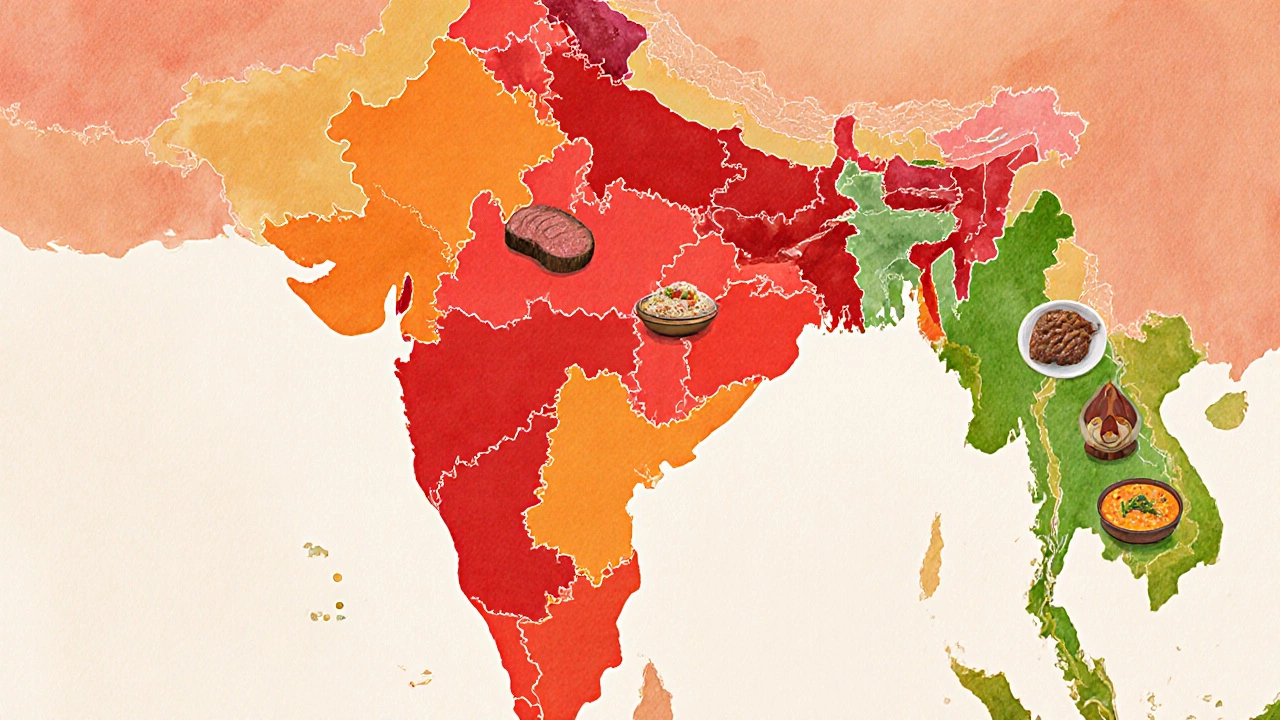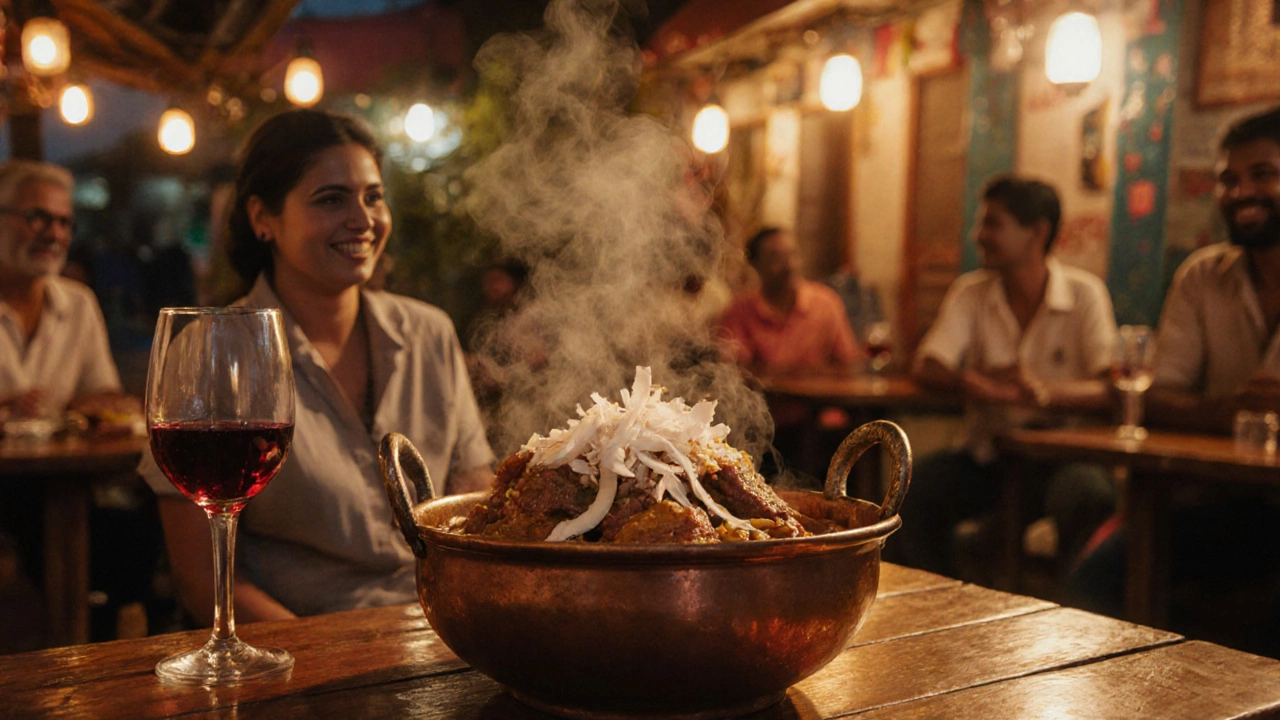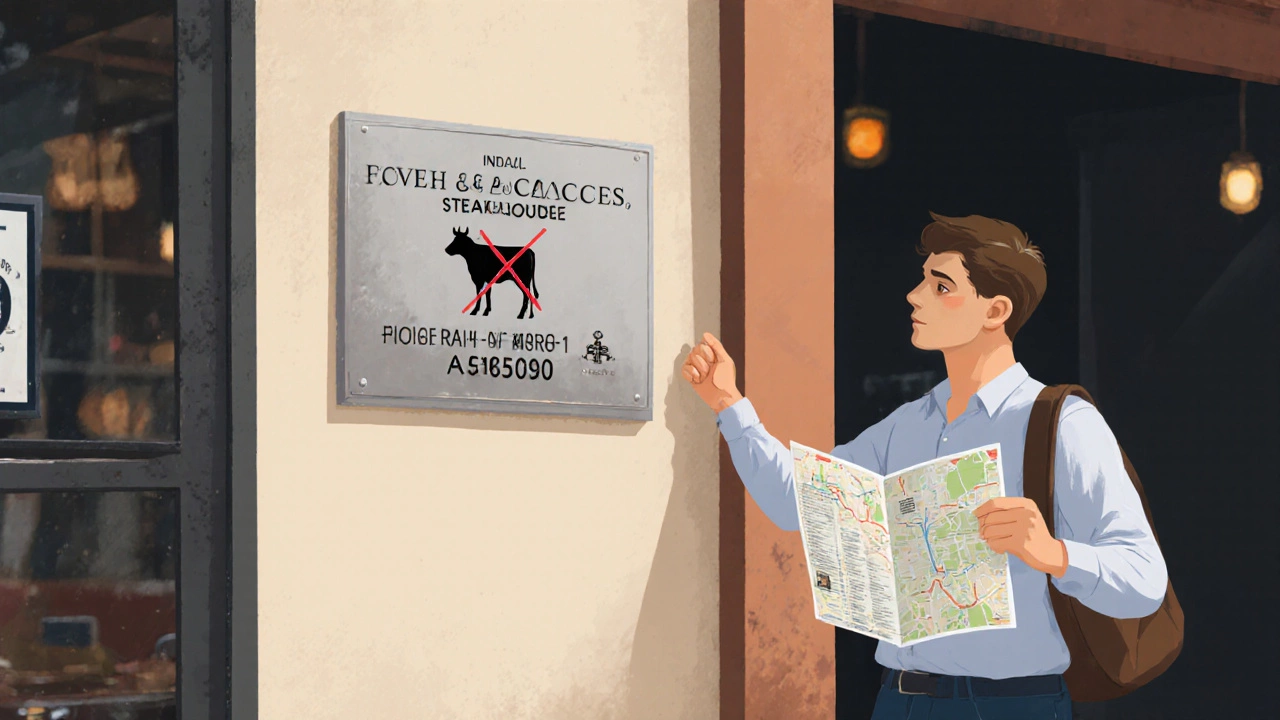Can You Eat Beef in India? Legal, Cultural & Practical Guide

Beef in India: State-by-State Guide
Select a state to see information about beef legality and typical dishes:
Kerala
Allowed (cow & buffalo)
Beef fry, curry with coconutGoa
Allowed (cow & buffalo)
Beef xacuti, vindalooMaharashtra
Buffalo beef allowed with permit
Buffalo steak, beef kebabsGujarat
Complete ban
—West Bengal
Allowed (cow & buffalo)
Beef bhuna, biryaniAssam
Allowed (cow & buffalo)
Traditional beef dishesWhen you think about Indian cuisine, lamb, chicken and vegetarian dishes often come to mind, but beef in India raises a lot of eyebrows. The question isn’t just about taste - it’s about laws, religion, regional attitudes and everyday realities. Below you’ll find a straight‑forward guide that tells you exactly what’s allowed, where, and how to respect local customs if you ever wonder whether you can order a steak in Delhi or a burger in Bangalore.
Legal Landscape: What the Law Says
Beef consumption in India is governed by a patchwork of state‑level statutes rather than a single national rule. The Constitution gives states the power to regulate agricultural products, and most Indian states have enacted their own cow‑protection or beef‑ban laws. Here’s a quick rundown:
- Complete bans: Gujarat, Rajasthan, Madhya Pradesh, Chhattisgarh, Karnataka, and several others prohibit the sale, transport, and possession of beef from cows and bullocks.
- Partial bans: In states like Maharashtra and Uttar Pradesh, the slaughter of cows and bullocks is illegal, but beef from buffaloes (often called "carabeef") is allowed under regulated permits.
- No bans: Goa, Kerala, West Bengal, and the northeastern states (e.g., Assam, Sikkim) allow the sale and consumption of all types of cattle meat, including cow beef, subject to standard food‑safety rules.
Violating these laws can lead to hefty fines, imprisonment, or even police harassment, especially in states with strict enforcement. If you’re traveling, the safest bet is to check the local regulations before ordering.
Religious & Cultural Context
Hinduism regards the cow as a sacred animal, symbolising motherhood and non‑violence. While Hindu scriptures do not explicitly forbid beef, centuries of cultural practice have elevated the cow to a revered status. Consequently, many Hindus-especially in rural areas-avoid beef outright.
India’s Muslim community, which makes up about 14% of the population, traditionally consumes beef, particularly buffalo meat, as part of Eid festivities and everyday meals. However, even among Muslims, regional preferences can shift; in states with strong cow‑protection sentiment, many avoid cow beef to reduce conflict.
Christian and Sikh populations are more varied. In the Northeast, Christian communities often include beef in their diet without controversy, while Sikhs, who respect the cow but do not consider it sacred, may eat buffalo meat but typically avoid cow meat.

Regional Flavours: Where Beef Is Common
| State | Beef Status | Typical Beef Dishes |
|---|---|---|
| Kerala | Allowed (cow & buffalo) | Beef fry, beef curry with coconut |
| Goa | Allowed (cow & buffalo) | Beef xacuti, vindaloo |
| Maharashtra | Buffalo beef allowed with permit | Buffalo steak, beef kebabs |
| Gujarat | Complete ban | - |
| West Bengal | Allowed (cow & buffalo) | Beef bhuna, beef biryani |
In coastal states like Kerala and Goa, beef dishes are integral to the local cuisine, often cooked with coconut milk, tamarind, and indigenous spices. In the northeast, beef is a staple in many tribal diets, prepared simply with mustard oil and local herbs.
Health, Safety & Food Standards
Regardless of legal status, food safety is a concern across India. The Food Safety and Standards Authority of India (FSSAI) Food Safety Authority sets standards for meat processing, labeling, and hygiene. In states where beef is legal, reputable restaurants usually source meat from licensed slaughterhouses that meet FSSAI norms.
In regions with bans, clandestine slaughter can lead to unregulated meat, increasing the risk of contamination, bacterial infections, or illegal additives. If you find yourself in a city where beef is allowed, look for outlets displaying an FSSAI license number and high turnover - these signs usually indicate fresher, safer meat.

Economic Impact: Why Beef Matters
The cattle industry contributes roughly 3% to India’s agricultural GDP. Buffalo meat, in particular, supports millions of farmers in states like Uttar Pradesh and Bihar. In states with strict bans, the livestock market shifts toward dairy production, dairy‑related employment, and alternative meat sources such as goat or chicken.
Tourism also feels the effect. Cities that welcome beef, such as Bangalore and Mumbai, have a thriving network of international‑style steakhouses and fast‑food chains, catering to expatriates and domestic travelers who crave non‑vegetarian options. Conversely, in heavily restricted states, foreign visitors often have to adjust their dining expectations.
Practical Tips for Travelers and Expats
- Research local laws before you travel. A quick search or a chat with locals can save you embarrassment or legal trouble.
- Stick to well‑known restaurants that display an FSSAI license. These places are more likely to follow safety guidelines.
- If you’re unsure about the type of meat, ask directly: "Is this beef from cow or buffalo?" Many servers will clarify.
- Respect cultural sensitivities. Even in states where beef is legal, some communities may feel uncomfortable seeing it served openly.
- Consider alternatives. In prohibited areas, dishes featuring paneer, lentils, or chicken can provide a similar culinary experience without the risk.
Remember, intent matters. Most authorities focus on preventing illegal slaughter and trade, not on penalising tourists who unknowingly order a beef dish in a legal zone.
Frequently Asked Questions
Is it illegal to eat beef in every part of India?
No. Beef legality varies by state. Some states enforce a total ban on cow and bull meat, while others allow buffalo meat or even cow beef. Always check local regulations before ordering.
Can tourists get arrested for eating beef?
In states with strict bans, police may intervene if you are found possessing or consuming illegal beef. However, incidents involving well‑behaved tourists are rare, especially if you stick to restaurants that display proper licensing.
What’s the difference between cow beef and buffalo meat?
Cow beef tends to be softer and milder, while buffalo meat (often called "carabeef") is darker, firmer, and slightly sweeter. Many Indian states permit buffalo meat because it is considered a separate species under law.
Are there any major Indian cities where beef is widely available?
Yes. Bangalore, Mumbai, Delhi (in certain areas), and Kolkata have numerous restaurants offering beef dishes, often focusing on buffalo meat. Coastal cities like Kochi and Goa also serve a variety of cow beef preparations.
How does the FSSAI ensure beef safety?
The FSSAI mandates licensed slaughterhouses, regular meat testing, and clear labeling of meat type. Restaurants displaying a valid FSSAI number are audited periodically to ensure compliance.